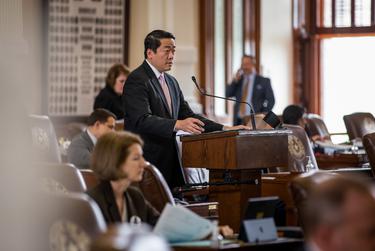Last Updated on May 26, 2021 – 1:22 AM CDT
This article originally appeared in The Texas Tribune: Read More
State Rep. Gene Wu, D-Houston, asks a question during session on the House floor.
Credit: Evan L’Roy/The Texas Tribune
Sign up for The Brief, our daily newsletter that keeps readers up to speed on the most essential Texas news.
With only a few hours until the final deadline for passing Senate bills in the Texas House, Democrats were pulling out all the stops Tuesday to keep the body from considering GOP-backed legislation they oppose.
The House has on its calendar several of the Senate’s priority bills, including a bill banning social media companies from blocking users because of their viewpoint or their location within Texas, another that would ban local governments from using public funds to pay for lobbyists, and another would force transgender student athletes to play on sports teams based on their biological sex instead of their gender identity.
Republicans control all branches of Texas government, and Democrats have been trying to fight back these bills since the beginning of the legislative session in January. The midnight deadline to pass the bills might be the minority party’s last hope.
The chamber started the day at 10 a.m. with 129 bills on its agenda, setting up a marathon of debating, voting and political maneuvering. Members spent the first half of the day giving final approval to bills the House had initially passed Monday, a usually procedural move that went beyond banking hours Tuesday as Democrats barraged their fellow lawmakers with questions, compliments and tactical procedures to slow down the chamber’s progress.
The tactics in the House caught the attention of lawmakers in the Senate, whose bills floundered with each passing minute the Democrats delayed. With plenty of House bills locked up in the upper chamber, the senators also began slowing their progress and ribbing state representatives who visited them during a lunch break.
Senators began making dog puns as Sen. José Menéndez, D-San Antonio, laid out a House bill that dealt with where pet store owners in large counties get their dogs and cats from, in an effort that targeted puppy mills.
“We don’t want it to be a dog-eat-dog world,” said Sen. Paul Bettencourt, R-Houston.
Menéndez called to Rep. Jared Patterson, R-Frisco, the bill’s author who walked into the chamber, to show him that the Senate was passing House bills.
“It’d be nice if we could get some good Senate bills passed as well,” Menéndez said.
Back in the House, groups of Democratic and Republican lawmakers huddled in different parts of the chamber, planning their strategies for the rest of the day: Democrats to stop bills they opposed, and Republicans to get as many of the bills that they’d worked on over the top.
Outside the chamber, opponents of the bill to restrict the participation of transgender student athletes in school sports held banners that read, “Stop SB 29,” and chanted, “Protect trans kids!”
Around 6 p.m. the House began taking up legislation that had been postponed by lawmakers on Tuesday in efforts to make last-minute tweaks or work out deals to ease the passage of those bills through the chamber.
But the tweaking was not done, as lawmakers continued to postpone bills, including some of the Senate’s priority bills for later in the night. The bills banning social media content moderation because of viewpoint and the use of local government funds to pay for lobbyists were among those delayed.
Further down the list — and therefore in more peril — were the measure related to transgender student athletes and a bill that would require people seeking an abortion in Texas to consult a state contractor about support services and other available resources before the procedure could be performed.
Near 7 p.m., the House took up Senate Bill 14, a measure banning cities and counties from requiring companies to pay workers more than the federal minimum wage or provide them with benefits like paid sick leave.
The bill is a revival of a similar measure that died in the 2019 legislative session.
Supporters say it will prevent regulatory confusion in a way that helps businesses with locations in multiple Texas cities regain their footing as the economy tries to recover from the pandemic’s devastating financial effects. But opponents say it reduces workers’ access to paid sick leave after they’ve been navigating the pandemic for more than a year.
The bill does not apply to municipalities’ employees or conditions of government contracts. It targets attempts by several Texas cities to mandate benefits for employees. In the past three years, Austin, Dallas and San Antonio passed paid sick leave ordinances, but court rulings have kept them from being enforced.
Democrats, who largely oppose the bill, were attempting to tack on amendments to soften its effect on the large counties where their party holds control of local governments. With each amendment, more time passed and the deadline inched closer.
As of 8:15 p.m., amendments were still being debated. Democrats had less than four hours to run out the clock.
